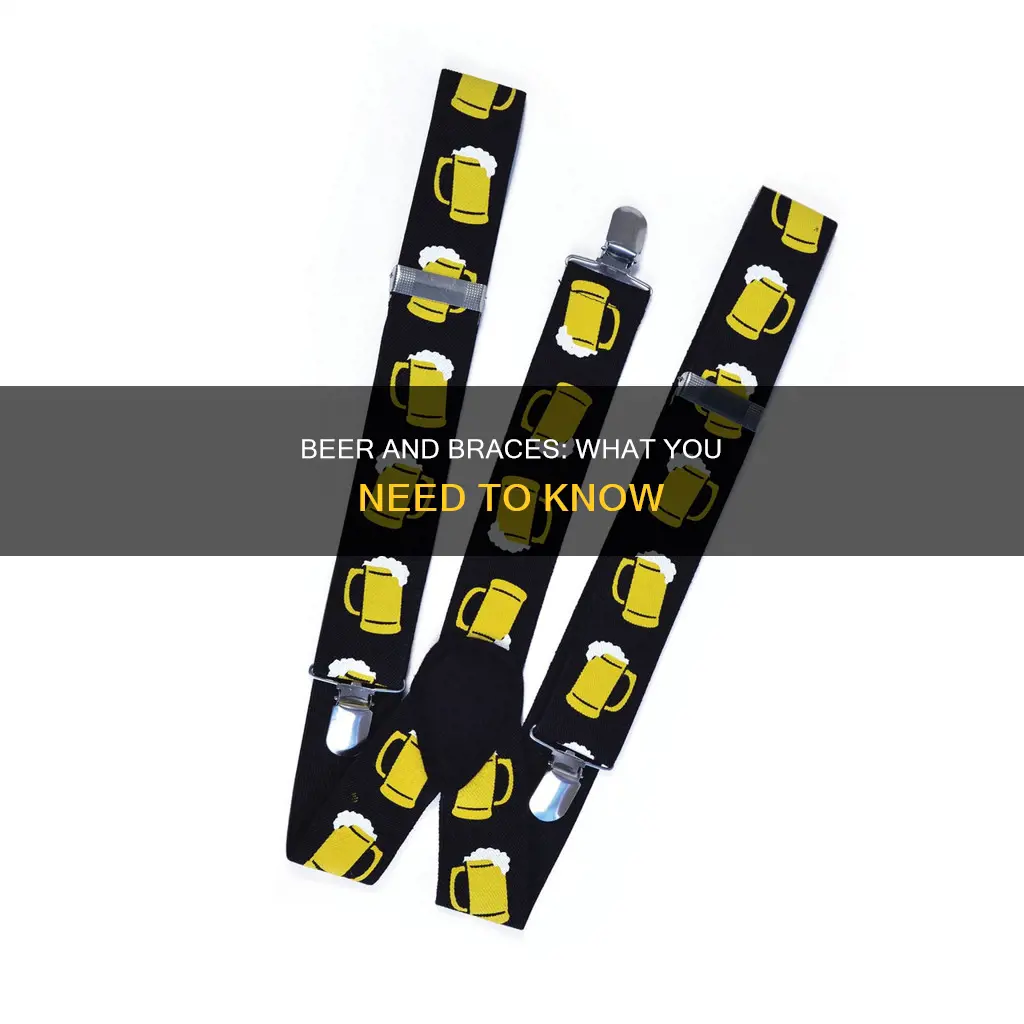
If you're wearing braces, you might be wondering if it's safe to drink beer or other alcoholic drinks. The good news is that drinking alcohol with braces is generally considered okay, as it won't cause broken wires or brackets. However, it's important to drink in moderation, as alcoholic drinks can contain high levels of sugar and acid, which can negatively affect your oral health. Dark-coloured drinks, such as red wine and dark beer, can also stain your teeth. So, if you're looking to maintain a bright and healthy smile, it's best to stick to clear drinks and remember to practice good oral hygiene.
| Characteristics | Values |
|---|---|
| Can you drink beer with braces? | Yes, but only in moderation. |
| Can you drink with Invisalign? | Yes, but you must remove your aligners before drinking anything other than water. |
| What drinks should be avoided with braces? | Sugary and acidic drinks such as soda, mixed alcoholic beverages, and sports drinks. |
| What drinks can cause staining with braces? | Coffee, tea, red wine, cranberry juice, and other dark-colored drinks. |
| How to prevent issues when drinking with braces or Invisalign? | Drink in moderation, use a straw, drink water, maintain oral hygiene, and visit your dentist regularly. |
What You'll Learn
- Drinking beer with braces won't damage wires or brackets, but it can stain teeth
- Beer is acidic and can erode tooth enamel, causing cavities
- Beer contains sugar, which bacteria feed on, leading to plaque
- Drinking through a straw may help avoid direct contact with teeth
- Water should be consumed to rehydrate, wash away acid and stimulate saliva production

Drinking beer with braces won't damage wires or brackets, but it can stain teeth
If you have braces, you might be wondering if it's safe to drink beer. After all, you don't want to damage your wires or brackets, and you're hoping to end up with straight, white teeth at the end of your treatment. So, can you enjoy a cold beer without ruining your chances of a perfect smile?
The good news is that drinking beer with braces won't damage the wires or brackets. Traditional braces are bonded to your teeth and made of stainless steel or a ceramic material that resists staining. This means that, to a certain extent, you can drink whatever you like. However, it's important to drink in moderation, as excess alcohol can negatively impact your oral health and overall well-being.
While beer won't break your braces, it's important to be aware that darker beers, like brown ales, stouts, and porters, can stain your teeth. This is because they contain dyes that can discolour your teeth. If you're aiming for pearly whites, it's best to stick to light-coloured beers or other clear drinks.
In addition to the type of beer you choose, there are a few other things to keep in mind when drinking with braces. Firstly, drinking slowly over a long period of time can negatively affect your teeth because it doesn't give your mouth time to balance its pH, allowing bacteria to thrive. Secondly, remember that alcohol can dry out your mouth, so it's important to drink plenty of water to stay hydrated and bolster saliva production, which will help wash away harmful bacteria. Finally, don't forget to maintain your oral health routine, including brushing and flossing, especially after a night of drinking.
In conclusion, while drinking beer with braces won't damage your wires or brackets, it's important to be mindful of the potential for staining, especially with darker beers. As always, moderation is key, and maintaining good oral hygiene habits will help ensure you end up with the healthy, bright smile you're working towards.
Beer and Driving: Is One Beer Too Many?
You may want to see also

Beer is acidic and can erode tooth enamel, causing cavities
Beer is generally safe to consume in moderation when wearing traditional metal braces, as it won't directly damage wires or brackets. However, it's important to be aware that beer is an acidic beverage, and this acidity can have detrimental effects on your teeth.
Acidic drinks, including beer, can weaken and erode tooth enamel, making your teeth more susceptible to cavities and staining. Enamel is the outermost layer of your teeth, and it plays a crucial role in protecting the sensitive inner structures. When enamel is weakened, your teeth become more vulnerable to decay and other dental issues.
The erosion of tooth enamel occurs because the acid in beer and other acidic beverages can dissolve the mineral content of your enamel, a process known as demineralization. This process can be exacerbated when harmful bacteria in your mouth feed on sugars and starches from the beer, producing additional acids that further attack the enamel.
To minimize the impact of beer on your tooth enamel, it's essential to practice good oral hygiene. This includes brushing your teeth twice a day with a fluoride toothpaste and flossing once daily. Additionally, drinking water alongside beer can help rinse away some of the acid and sugar, reducing their prolonged contact with your teeth.
It's worth noting that darker beers, such as brown ales, stouts, and porters, may also cause teeth staining. If maintaining a pearly white smile is important to you, opting for lighter-coloured beers or other clear alcoholic beverages may be a better choice.
Drinking after one beer: What's the harm?
You may want to see also

Beer contains sugar, which bacteria feed on, leading to plaque
It is important to understand the relationship between our teeth and the drinks we consume. All of us have bacteria in our mouths, and while some of it is good, some of it is harmful. These harmful bacteria feed off the sugars and starches that coat our teeth when we consume certain foods and beverages. When this happens, the bacteria release acids that eat away at our tooth enamel and form a sticky substance called plaque. Eventually, this can lead to cavities.
Beer, like many other alcoholic drinks, contains sugar. This sugar becomes food for the bacteria in our mouths, which then release acids that contribute to the formation of plaque. While drinking beer with braces will not directly damage your braces or cause broken wires or brackets, the presence of braces creates additional spaces for plaque and bacteria to accumulate. Therefore, it is recommended that individuals with braces limit their intake of sugary and acidic beverages, including beer and other alcoholic drinks mixed with soda or juice.
The negative impact of beer or other alcoholic drinks on oral health is not limited to the potential for plaque buildup. The high acid content in many alcoholic drinks, including beer, can also contribute to enamel erosion if left on the teeth for too long. Additionally, darker beers, similar to red wine, can stain your teeth, negatively affecting the appearance of your smile.
To maintain good oral health while consuming beer or other alcoholic beverages with braces, it is important to practice moderation and prioritize proper oral hygiene. Drinking water alongside alcoholic drinks can help rinse away some of the sugar, acid, and plaque, and it also stimulates saliva production, which is crucial for neutralizing plaque acids. Maintaining a consistent oral hygiene routine, including brushing and flossing, is essential, especially after consuming sugary or acidic drinks.
Old Beer in Fridge: Still Drinkable?
You may want to see also

Drinking through a straw may help avoid direct contact with teeth
Drinking with braces won't damage your wires or brackets, and there are no major restrictions when it comes to beverages. However, wearing braces makes you more susceptible to plaque build-up and staining. This is because there are extra nooks and crannies for plaque and bacteria to hide, and brackets cover portions of your teeth, which can result in discolouration.
Drinks with high levels of acid, such as sodas, fruit juices, and cocktails, can erode tooth enamel if left on the teeth for too long. This can make you more prone to disease-causing bacteria. Drinks with high levels of sugar, including sodas, fruit juices, and many alcoholic drinks, can also be harmful. Bacteria feed on the sugar left on your teeth and leave acid behind.
To avoid direct contact with your teeth, you can drink through a straw. This may help to reduce the risk of enamel erosion and tooth discolouration. However, it's important to note that drinking through a straw may not completely eliminate these risks. Additionally, it's worth considering the environmental impact of using plastic straws and opting for reusable alternatives instead.
Drinks with high levels of acid and sugar, such as sodas and mixed alcoholic beverages, are best consumed in moderation. Drinking water can help to rinse away some of the acid, sugar, and plaque, and it stimulates saliva production, which is important for neutralising plaque acids and keeping teeth healthy.
Tongue Piercing and Beer: What's Safe?
You may want to see also

Water should be consumed to rehydrate, wash away acid and stimulate saliva production
It is important to stay hydrated, especially when consuming alcoholic beverages. Water is the best option for rehydration, and it also has the added benefit of washing away harmful acids produced by bacteria in the mouth. These acids can erode tooth enamel, making teeth more susceptible to cavities and staining. Water also stimulates saliva production, which is crucial for neutralizing plaque acids and maintaining good oral health.
Drinking water is an easy and effective way to promote oral health and prevent issues such as cavities and tooth decay. It is a simple step that can be incorporated into one's daily routine to ensure the health and longevity of teeth, especially for those with braces or other orthodontic treatments.
For individuals with braces, proper oral hygiene is essential to prevent plaque buildup and maintain healthy teeth and gums. Water plays a crucial role in this process by helping to wash away sugar, acid, and plaque that can accumulate around the brackets and wires of braces. Drinking water throughout the day, especially after consuming sugary or acidic drinks, can help keep the mouth clean and reduce the risk of dental issues.
Additionally, water can also help to dilute and wash away the bacteria that feed on sugars and starches left on the teeth. This is particularly important for individuals with braces, as the brackets and wires can create additional spaces for bacteria to hide and multiply. By drinking water regularly, individuals can help prevent the formation of plaque and maintain good oral health.
Stimulatory effects on saliva production are another advantage of drinking water. Saliva plays a vital role in oral health by neutralizing plaque acids and helping to keep teeth strong and healthy. Drinking water regularly ensures a consistent supply of saliva, which can help combat the negative effects of bacteria and maintain a healthy pH balance in the mouth.
In conclusion, drinking water is essential for maintaining good oral health, especially for individuals with braces. It helps to rehydrate the body, wash away harmful acids and bacteria, and stimulate saliva production. By incorporating water into one's daily routine and staying properly hydrated, individuals can effectively support their oral health and maintain a bright and healthy smile.
Beer Transfer Mechanics: How Does It Work?
You may want to see also
Frequently asked questions
Yes, you can drink beer with braces. Traditional braces are made of stainless steel or a ceramic material that resists staining, so you can drink whatever you like to a certain extent. However, it's important to drink in moderation as alcoholic drinks are often high in sugar and acid, which can cause tooth decay.
Drinking beer with braces can lead to plaque buildup as there are more spots for bacteria to accumulate. Additionally, darker beers can stain your teeth, so it's best to stick to light-coloured beers.
Clear liquor, light-coloured beers and white wine are less likely to stain your teeth. However, it's important to remember that all alcoholic drinks can negatively impact your oral health if consumed in excess.







